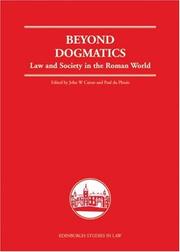| Listing 1 - 10 of 15 | << page >> |
Sort by
|

ISBN: 9782234054226 2234054222 Year: 2001 Publisher: Paris: Stock,
Abstract | Keywords | Export | Availability | Bookmark
 Loading...
Loading...Choose an application
- Reference Manager
- EndNote
- RefWorks (Direct export to RefWorks)
Judgments - France - History. --- Law - Social aspects - France. --- Justice - History of Law --- Judgments --- Law

ISBN: 2091904333 9782091904337 Year: 1996 Publisher: Paris: Fernand Nathan,
Abstract | Keywords | Export | Availability | Bookmark
 Loading...
Loading...Choose an application
- Reference Manager
- EndNote
- RefWorks (Direct export to RefWorks)
Ethnological jurisprudence --- Sociological jurisprudence --- Ethnologie juridique --- Sociologie juridique --- Droit --- Law --- Aspect social --- Social aspects --- Anthropologie juridique --- Anthropologie juridique. --- Sociologie juridique. --- Aspect social. --- Droit - Aspect social --- Law - Social aspects
Book
ISBN: 9781509914531 1509914536 9781509914555 9781509914548 1509914544 9781509914562 1509914560 1509914552 Year: 2018 Volume: volume 86 Publisher: Oxford ; Portland. Oregon : Hart Publishing,
Abstract | Keywords | Export | Availability | Bookmark
 Loading...
Loading...Choose an application
- Reference Manager
- EndNote
- RefWorks (Direct export to RefWorks)
This book is concerned with the social legitimacy of internal market law. What does social legitimacy entail within the multi-level 'embedded liberalism' construction of the internal market? How can the objectives of the internal market that focus on economic rights and a commitment to social diversity both be pursued without one necessarily trumping the other? These questions continue to challenge the very core of European integration. How can the diversity of Member States' 'social systems' and the varying normative infrastructure of their economies be sustainably accommodated within the internal market? This book seeks to contribute to these questions by discussing what has come to be known as the argument from transnational effects and the development of an adjudicative model for the European Court of Justice that can be termed 'socially responsive'. Drawing on the historical insights of Karl Polanyi it argues that the internal market can only be held to be socially legitimate where it supports the requirement for further market integration while still responding to social practices and values within the member states. The book presents in-depth studies of the case law of the Court in the areas of EU free movement, competition and state aid law. In so doing, this important new study aims to provide the language and tools for assessing social legitimacy in the internal market
Law --- Social aspects --- Droit --- Aspect social --- Europe --- European law --- Economic law --- European Union --- European Union countries. --- Social aspects. --- Law - Social aspects - European Union countries
Book
ISBN: 9780521687119 9780521867511 052168711X 0521867517 9780511780813 1107210267 0511852452 9786612908200 0511931263 0511932618 0511929935 0511924887 0511780818 1282908200 0511927428 9780511929939 9780511932618 9780511927423 9781107210264 9780511852459 9781282908208 6612908203 9780511931260 9780511924880 Year: 2010 Publisher: New York: Cambridge university press,
Abstract | Keywords | Export | Availability | Bookmark
 Loading...
Loading...Choose an application
- Reference Manager
- EndNote
- RefWorks (Direct export to RefWorks)
"In this book, Andrew Riggsby offers a survey of the main areas of Roman law, both substantive and procedural, and how the legal world interacted with the rest of Roman life. Emphasising basic concepts, he recounts its historical development and focuses in particular on the later Republic and early centuries of the Roman Empire. The volume is designed as an introductory work, with brief chapters that will be accessible to college students with little knowledge of legal matters or Roman antiquity. The text is also free of technical language and Latin terminology. It can be used in courses on Roman law, Roman history, or comparative law, but it will also serve as a useful reference for more advanced students and scholars"--
Roman law --- Droit romain --- Social aspects --- Aspect social --- Social aspects. --- Civil law --- Civil law (Roman law) --- Law --- Law, Roman --- Arts and Humanities --- History --- Roman law - Social aspects --- Civil law.
Book
ISBN: 9782862724591 2862724599 Year: 2007 Publisher: Saint-Etienne: Publications de l'Université de Saint-Étienne,
Abstract | Keywords | Export | Availability | Bookmark
 Loading...
Loading...Choose an application
- Reference Manager
- EndNote
- RefWorks (Direct export to RefWorks)
Disciplinary power --- Professions --- Law --- Sanctions (Law) --- Law and legislation --- Social aspects --- Disciplinary power - France - Congresses --- Professions - Law and legislation - France - Congresses --- Law - Social aspects - France - Congresses --- Sanctions (Law) - France - Congresses
Book
ISBN: 9781107610569 9780521116213 052111621X 9780511895067 1107610567 1139097350 1107212847 1139103172 9786613341761 1139100718 1139101374 1139098683 128334176X 0511895062 1139099353 9781139101370 Year: 2011 Publisher: Cambridge: Cambridge university press,
Abstract | Keywords | Export | Availability | Bookmark
 Loading...
Loading...Choose an application
- Reference Manager
- EndNote
- RefWorks (Direct export to RefWorks)
Using a methodology that both analyzes particular constitutional texts and theories and reconstructs their historical evolution, Chris Thornhill examines the social role and legitimating status of constitutions from the first quasi-constitutional documents of medieval Europe, through the classical period of revolutionary constitutionalism, to recent processes of constitutional transition. A Sociology of Constitutions explores the reasons why modern societies require constitutions and constitutional norms and presents a distinctive socio-normative analysis of the constitutional preconditions of political legitimacy.
Theory of the state --- Constitutional history --- Constitutional law --- Social aspects --- Constitutional limitations --- Constitutionalism --- Constitutions --- Limitations, Constitutional --- Public law --- Administrative law --- Constitutional history, Modern --- History --- Interpretation and construction --- Law --- General and Others --- Constitutional law - Social aspects --- Constitutional history. --- Social aspects.
Book
ISBN: 1139891448 1107424399 1107422442 1107419360 1107546087 1107416698 1107420555 1139507508 1107418062 9781107416697 9781139507509 9781107419360 9781107032880 1107032881 1306071984 Year: 2013 Publisher: New York
Abstract | Keywords | Export | Availability | Bookmark
 Loading...
Loading...Choose an application
- Reference Manager
- EndNote
- RefWorks (Direct export to RefWorks)
This volume analyses the social and political forces that influence constitutions and the process of constitution making. It combines theoretical perspectives on the social and political foundations of constitutions with a range of detailed case studies from nineteen countries. In the first part leading scholars analyse and develop a range of theoretical perspectives, including constitutions as coordination devices, mission statements, contracts, products of domestic power play, transnational documents, and as reflection of the will of the people. In the second part these theories are examined through in-depth case studies of the social and political foundations of constitutions in countries such as Egypt, Nigeria, Japan, Romania, Bulgaria, New Zealand, Israel, Argentina and others. The result is a multidimensional study of constitutions as social phenomena and their interaction with other social phenomena.
Constitutional law --- Constitutions. --- Associations, institutions, etc. --- Law --- Constitutional limitations --- Constitutionalism --- Constitutions --- Limitations, Constitutional --- Public law --- Administrative law --- Social aspects. --- Political aspects. --- Interpretation and construction --- General and Others --- Constitutional law - Social aspects --- Constitutional law - Political aspects

ISBN: 9780748627936 9780748631773 0748631771 1281251925 9781281251923 9780748651474 0748651470 6611251928 9786611251925 0748627936 Year: 2007 Publisher: Edinburgh: Edinburgh University Press in association with The Aga Khan University,
Abstract | Keywords | Export | Availability | Bookmark
 Loading...
Loading...Choose an application
- Reference Manager
- EndNote
- RefWorks (Direct export to RefWorks)
This book provides a survey of the debate about the relationship between law and society in the Roman world.
Sociological jurisprudence. --- Roman law. --- Law --- Social aspects --- Law and society --- Society and law --- Sociology of law --- Jurisprudence --- Sociology --- Law and the social sciences --- Civil law --- Civil law (Roman law) --- Law, Roman --- Acts, Legislative --- Enactments, Legislative --- Laws (Statutes) --- Legislative acts --- Legislative enactments --- Legislation --- Sociological jurisprudence --- Law - Social aspects - Rome.

ISBN: 0754649350 9780754649359 9781315581569 9781317137634 9781317137641 9781138250901 Year: 2007 Publisher: Aldershot: Ashgate,
Abstract | Keywords | Export | Availability | Bookmark
 Loading...
Loading...Choose an application
- Reference Manager
- EndNote
- RefWorks (Direct export to RefWorks)
Feminist jurisprudence --- Sociological jurisprudence --- Law --- Social aspects --- Law and society --- Society and law --- Sociology of law --- Jurisprudence --- Sociology --- Law and the social sciences --- Acts, Legislative --- Enactments, Legislative --- Laws (Statutes) --- Legislative acts --- Legislative enactments --- Legislation --- Feminism, Legal --- Legal feminism --- Feminist theory --- Law - Social aspects - Sweden
Book
ISBN: 1316322483 1316325822 131632916X 1316332500 1316319121 1107239354 9781316319123 9781107239357 9781316332504 9781107047501 1107047501 1316315789 1316288374 131630910X 9781316329160 Year: 2015 Publisher: New York: Cambridge university press,
Abstract | Keywords | Export | Availability | Bookmark
 Loading...
Loading...Choose an application
- Reference Manager
- EndNote
- RefWorks (Direct export to RefWorks)
"In Civilization and Its Discontents, Sigmund Freud argued that civilization itself is the major source of human unhappiness, inhibiting instincts and generating guilt. In Globalization and Its Discontents, Joseph Stiglitz shows how the "economic architecture" that produced globalization has also driven the backlash against it. This book brings together some of international law's most outspoken "discontents;" those who situate their malaise in international law itself. Their shared objective is to expose international law's complicity in the ongoing economic and financial global crises and to assess its capacity - and its will - to constructively address them. Some, like Freud, view that which holds us together as an inevitable source of discontent. Others, like Stiglitz, draw on the energy of the backlash. How have these crises affected particular groups, sovereign states, and international law itself? How have they responded? When does crisis serve as a catalyst, and for what? "-- "In Civilization and its Discontents, Sigmund Freud argued that civilization itself is the major source of human unhappiness, inhibiting instincts and generating guilt. In Globalization and its Discontents, Joseph Stiglitz shows how the 'economic architecture' that produced globalization has also driven the backlash against it. This book brings together some of international law's most outspoken 'discontents'; those who situate their malaise in international law itself. Their shared objective is to expose international law's complicity in the ongoing economic and financial global crises and to assess its capacity - and its will - to constructively address them. Some, like Freud, view that which holds us together as an inevitable source of discontent. Others, like Stiglitz, draw on the energy of the backlash. How have these crises affected particular groups, sovereign states, and international law itself? How have they responded? When does crisis serve as a catalyst, and for what?"--
Law --- Comparative law. --- International law and human rights. --- Human rights and international law --- Human rights --- Comparative jurisprudence --- Comparative legislation --- Jurisprudence, Comparative --- Law, Comparative --- Legislation, Comparative --- Acts, Legislative --- Enactments, Legislative --- Laws (Statutes) --- Legislative acts --- Legislative enactments --- Jurisprudence --- Legislation --- Social aspects. --- Economic aspects. --- Comparative law --- International law and human rights --- Social aspects --- Economic aspects --- Law - Social aspects --- Law - Economic aspects
| Listing 1 - 10 of 15 | << page >> |
Sort by
|

 Search
Search Feedback
Feedback About UniCat
About UniCat  Help
Help News
News